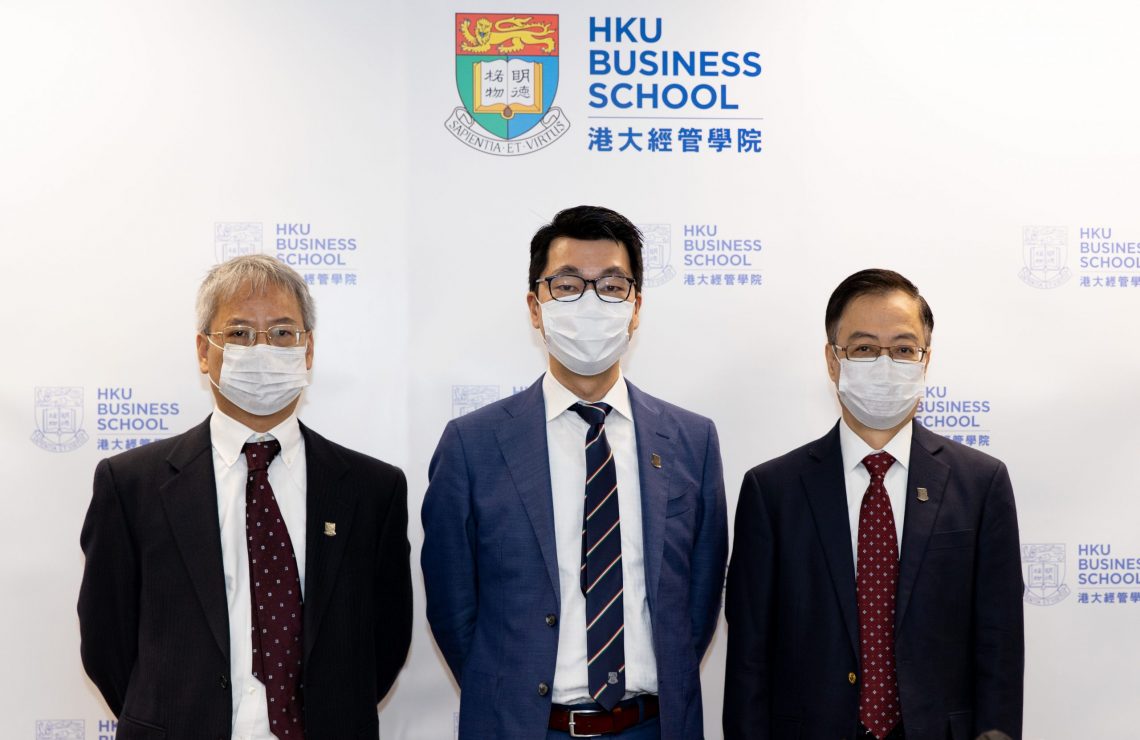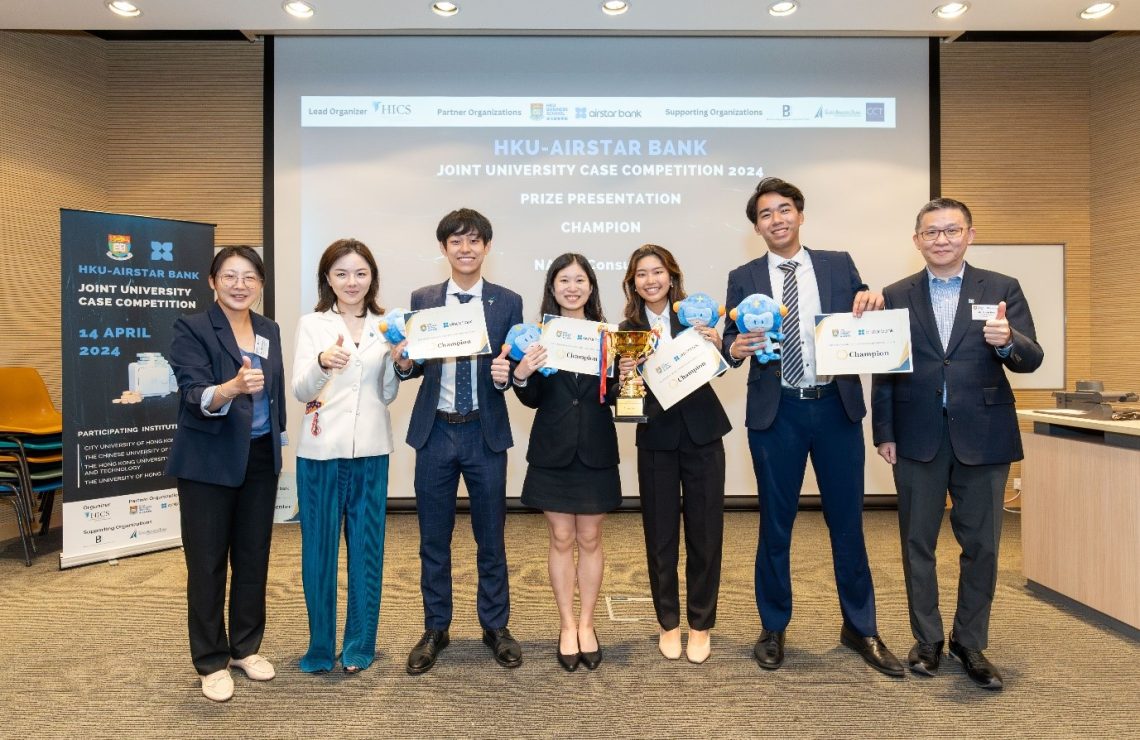
HKU Business School Responds to 2021-22 Budget
Entering its 20th anniversary, HKU Business School continues to promote economic policy research proactively and organise relevant activities, with an aim to encourage discussion on the economic policies and further contribute to the development of the society through its knowledge and expertise. Following the recent publishing of the “Hong Kong Economic Policy Green Paper” jointly with Hong Kong Institute of Economics and Business Strategy (HIEBS), the School organised another press conference today, with scholars responding to the 2021-22 Budget Speech that was delivered yesterday.
The response from five scholars of the School to the Budget are as follows:
Professor in Economics, HKU Business School and Associate Director, Hong Kong Institute of Economics and Business Strategy
The outlook of the Hong Kong economy is comparatively worse than the year 2018. Hong Kong has already recorded negative GDP growth in two consecutive years (-1% and -7.1% in 2019 and 2020 respectively), which is equivalent to a total of $270 billion. This implies that the government’s counter-cyclical measures in the Budget are not potent enough.
The 2021-22 Budget has earmarked $36 billion for the issuance of electronic consumer vouchers. Although the use of the vouchers has a validity period, it will be more effective in stimulating consumption and benefiting the market when comparing with cash payout. However, looking back to previous cash payout schemes, distributing the vouchers over 5 separate installments likely means that citizens can only receive the first installment by July. Industries such as tourism, catering, and others in the service sectors are desperately in need of help and this policy may not be able to address their urgent needs.
It is encouraging that the budget has mentioned multiple mid-term and long-term investments plans, including projects supporting Innovation and Technology, and the reindustrialisation of Hong Kong. The budget has painted a beautiful picture to society. However, at this stage, the content in the Budget are mostly broad policy directions without any development commitments and execution details. I believe that these policies are still lacking in potency.
Although this year’s budget deficit is higher than previous years, it is justifiable for the government to spend more to fight against a pandemic unseen in a century. Moreover, the Financial Secretary has also mentioned bringing back investment returns from various funds to enrich the financial reserves. That said, Hong Kong possesses capital from sources in addition to the financial reserves to strengthen the government’s counter-cyclical measures. We do not have to worry too much about the fiscal deficit we are facing.
Associate Professor in Economics, HKU Business School
The 2021-22 Budget proposes to raise the rate of stamp duty on stock transfers on both buy-side and sell-side from 0.1% to 0.13%. Compared with other major international financial centres, the US has a stamp duty rate close to zero, while China only levies a 0.1% of stamp duty on the sell-side. I am afraid that this proposal may severely undermine the competitiveness of Hong Kong as an international financial centre.
Raising the rate of stamp duty on stock transfers will increase transaction costs and dampen trading volumes, unlikely to bring an additional 30% of income to the treasury as estimated. As trading volumes decrease subsequently, companies will be less interested to get listed in Hong Kong, which is detrimental to our capital flow. The government should instead reduce the stamp duty rate to 0.05% to bolster trading volume, and in the meantime, avoid causing negative effects on our tax revenue.
As the economic recession is caused by the pandemic instead of problems within our financial system, I am confident that the Hong Kong economy will rebound once the pandemic is over. Moreover, ever since the government set up the Future Fund in 2016, it is the first time to bring back investment returns to the fiscal reserves, with an amount of $25 billion. Estimated by market conditions, the totality of the investments returns are not fully reflected in the budget. When drafting future budgets, the government should focus on increasing investment returns to enrich Hong Kong’s financial reserves.
Principle Lecturer in Finance, HKU Business School
The budget this year is fair and pragmatic. It has managed to keep the expenditure within the limits of revenues while achieving a fiscal balance.
The budget proposes to issue electronic consumption vouchers with a total value of $5,000. This is a shot in the arm to industries affected the most by the pandemic. The vouchers will be issued in instalments and to be consumed within a validity period. The service sector and the catering industry will be benefited the most. As the development of electronic money in Hong Kong has been lagging behind neighboring regions, the government can capitlise this opportunity to encourage citizens and shop owners to use electronic trading platforms given that the voucher is in digital form.
The budget has also proposed to set up a special 100% loan guarantee for individuals scheme to relieve the hardship of unemployed people. The government will offer a guarantee for loans provided under the scheme to reduce administrative burdens. Compared with the proposal of allowing citizens to mortgage their MPF savings to apply for bank loans, the new scheme can prevent potential legal problems while benefiting local banks, which is very ideal.
As it is likely that the government will be suffering from a financial deficit for continuous years, it is essential to explore different options to develop stable sources of income. In the future, the government could also consider to launch a “robin hood tax” for the high-income group. For example, to increase the income tax rate for individuals with an annual salary income over $2 million dollars from 17% to 17.5%. The government could earn an additional $1 billion income from it. If the additional income is going to be allocated for poverty relief purposes, the expected results would be splendid.
Associate Professor in Economics, HKU Business School
The 2021-22 Budget proposes to commence a review on the existing rating system, including the possibility of introducing a progressive element to the rating system and that for providing rates concession to owner-occupied properties on a regular basis. These are all positive initiatives as raising rates can provide the government a stable source of constant income. Rates is a form of regular property tax and it is more effective than one-off property stamp duty in lowering housing demand. The government should review property stamp duties as well in order to strategise a more comprehensive policy.
On the other hand, the government proposes to provide rates concession for domestic properties for four quarters of 2021-22, as one of the hardship relief measures. The concessionary amount in the combined four quarters is subjected to a ceiling of $5000. Another relief measure is reducing salaries tax and tax under personal assessment for the year of assessment 2020/21 by 100%, subject to a ceiling of $10,000. The budget also proposes to issue electronic consumption vouchers in instalments with a total value of $5,000 to each eligible Hong Kong permanent resident and new arrival aged 18 or above, instead of launching cash payout schemes compared with previous years. This has created an expectation gap with the citizens. The government should consider consolidating the aforementioned 3 policies and handing out $15,000 in cash to all Hong Kong permanent residents, which appears to be fairer.
HSBC Professor in Global Economy and Business Strategy
To contain the pandemic and integrate into the mainland’s dual circulation development strategy are the keys to rejuvenate the Hong Kong economy. The 2021-22 Budget proposes to issue electronic consumption vouchers in instalments, with the aim of spurring domestic consumption and stimulating the local economy. However the effectiveness of this policy hinges on the development of the pandemic, and whether the government can relax social distancing measures, and completely remove the prohibition on group gathering.
As the economic recession is mainly brought by the pandemic, the key to recovery depends on the elimination of factors restricting consumption. Once the pandemic is under control, Hong Kong can stimulate domestic consumption, resume cross-boundary travel with the mainland, and take part in its internal circulation. Our economy will consequently recover.
On the other hand, when raising the rate of stamp duty on stock transfers, Hong Kong should make references to other major international financial centres. An overbearing stamp duty rate will dampen the impetus of enterprises to get listed in Hong Kong, weakening our position as an international financial centre.







